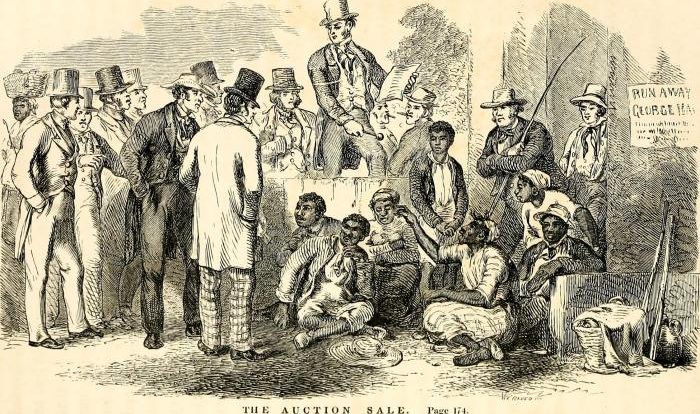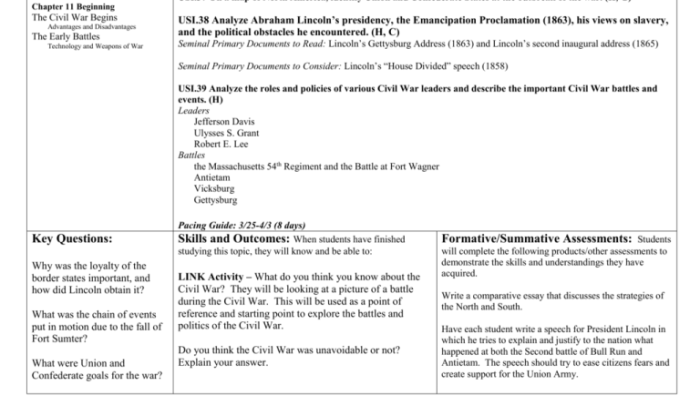In search of history salem witch trials answer key – In Search of History: Salem Witch Trials Answer Key unlocks the enigmatic tale of the Salem Witch Trials, a pivotal chapter in American history. This narrative delves into the intricate tapestry of events, characters, and social dynamics that shaped this extraordinary episode.
The Salem Witch Trials, a crucible of fear, superstition, and injustice, left an enduring mark on American society. This exploration examines the underlying causes, legal proceedings, and lasting legacy of these trials, offering insights into the complexities of human nature and the fragility of justice.
Salem Witch Trials Overview
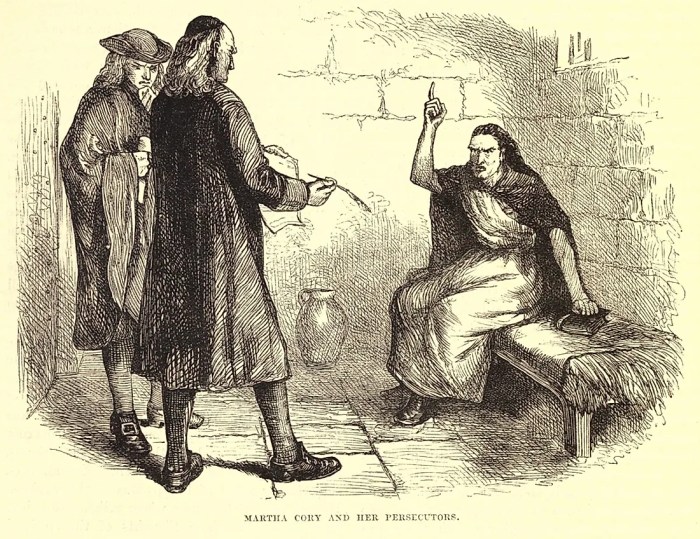
The Salem Witch Trials were a dark period in American history marked by widespread accusations of witchcraft, leading to the unjust execution of innocent individuals. These trials occurred in the Massachusetts Bay Colony between 1692 and 1693, leaving a lasting impact on the nation’s legal and social fabric.
The trials were sparked by a combination of factors, including religious extremism, social tensions, and a widespread belief in the supernatural. The accusations began in the village of Salem, Massachusetts, and quickly spread to other surrounding towns.
Key Events and Characters
- Accusations and Arrests:The trials began with accusations of witchcraft made by a group of young girls. These accusations led to the arrest of over 150 individuals, including men, women, and children.
- Witchcraft Trials:The accused were subjected to unfair trials, often based on spectral evidence and hearsay. The presiding judge, William Stoughton, was known for his harsh treatment of the accused.
- Executions:Twenty individuals were found guilty of witchcraft and executed by hanging. The executions took place on Gallows Hill in Salem.
Causes of the Trials: In Search Of History Salem Witch Trials Answer Key
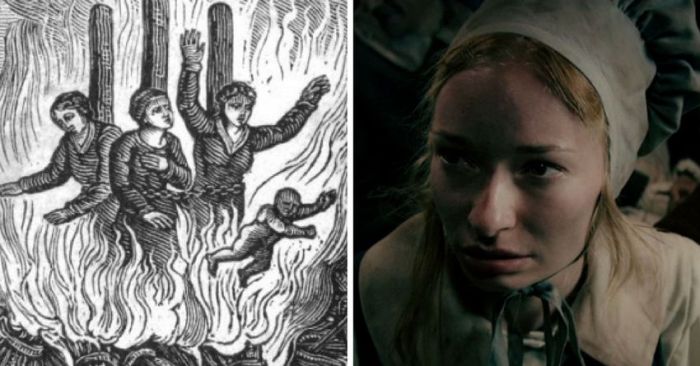
The Salem Witch Trials were caused by a complex interplay of social, political, and religious factors.
Social Factors
- Puritan Society:Salem was a Puritan community, characterized by strict religious beliefs and a strong emphasis on moral conduct. The belief in witchcraft was deeply ingrained in Puritan society.
- Economic Tensions:The Salem community was experiencing economic hardship, which contributed to social tensions and a search for scapegoats.
Political Factors
- Political Instability:The Massachusetts Bay Colony was undergoing political turmoil, with tensions between the colony’s leaders and the growing population.
- Power Struggles:The trials provided an opportunity for certain individuals to gain power and influence within the community.
Religious Factors
- Witchcraft Beliefs:Puritans believed that witchcraft was a real threat and that witches were in league with the devil.
- Religious Enthusiasm:The trials coincided with a period of religious revival, which fueled the belief in witchcraft and the desire to root out evil.
Trial Procedures
The Salem Witch Trials were conducted using legal and judicial processes that were deeply flawed and biased against the accused.
Accusation and Examination
- Spectral Evidence:Accusers claimed to have seen the accused witches’ specters tormenting them, which was considered valid evidence.
- Examination:The accused were subjected to physical examinations, such as searching for “witch’s marks” on their bodies.
Trial and Sentencing
- Trial by Jury:The accused were tried by a jury of 12 men, who were often influenced by superstition and fear.
- Guilty Verdicts:The majority of the accused were found guilty, based on flimsy evidence and the testimony of unreliable witnesses.
- Sentencing:Those found guilty were sentenced to death by hanging.
Victims of the Trials
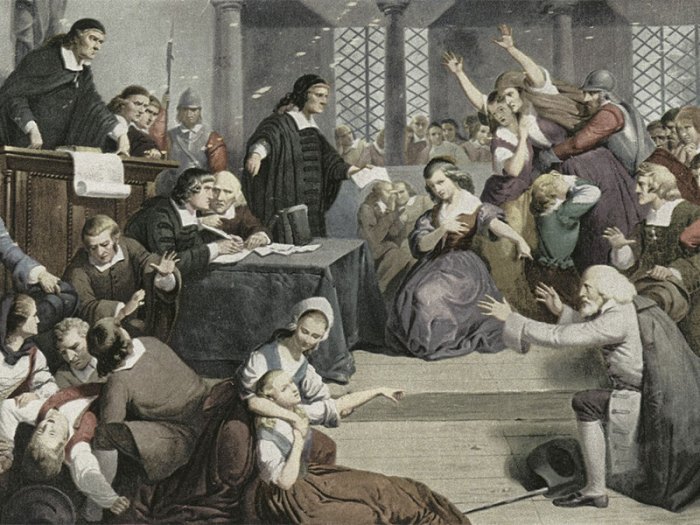
The victims of the Salem Witch Trials were individuals from all walks of life, including men, women, and children. Many of them were innocent people who were falsely accused and executed.
Backgrounds of the Accused
- Social Status:The accused came from diverse social backgrounds, ranging from wealthy landowners to poor farmers.
- Age and Gender:The majority of the accused were women, but men and children were also targeted.
- Occupation:Many of the accused were housewives, but others had various occupations, such as farmers, merchants, and ministers.
Experiences during the Trials
- Imprisonment:The accused were held in crowded and unsanitary prisons, often for months before their trials.
- Torture:Some of the accused were subjected to torture in order to extract confessions.
- Execution:Twenty individuals were executed by hanging on Gallows Hill in Salem.
Legacy of the Trials
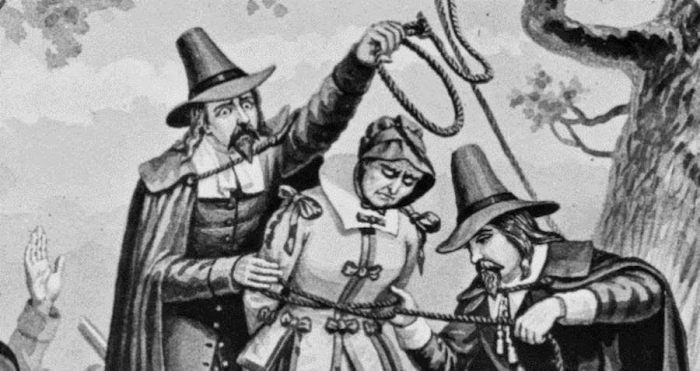
The Salem Witch Trials have had a lasting impact on American society, shaping our understanding of justice, due process, and the dangers of mass hysteria.
Lessons Learned
- Importance of Due Process:The trials demonstrated the need for fair and impartial legal proceedings to protect the innocent.
- Dangers of Hysteria:The trials highlighted the dangers of mass hysteria and the need to be skeptical of accusations based on fear and superstition.
Cultural Impact, In search of history salem witch trials answer key
- Literature and Art:The Salem Witch Trials have been the subject of numerous works of literature, art, and film, exploring themes of injustice, superstition, and the fragility of human rights.
- Historical Memory:The Salem Witch Trials serve as a reminder of the importance of historical memory and the need to learn from the mistakes of the past.
Questions Often Asked
What were the primary causes of the Salem Witch Trials?
A complex interplay of social, political, and religious factors contributed to the trials, including heightened tensions within the community, accusations of witchcraft, and a climate of fear and superstition.
How were individuals accused and convicted of witchcraft during the trials?
Accusations were often based on spectral evidence (dreams or visions) and hearsay. Trials were conducted in a highly charged atmosphere, with little regard for due process or the rights of the accused.
What was the long-term impact of the Salem Witch Trials?
The trials left a lasting legacy of fear, distrust, and skepticism. They also led to significant legal reforms and a greater emphasis on the protection of individual rights.
